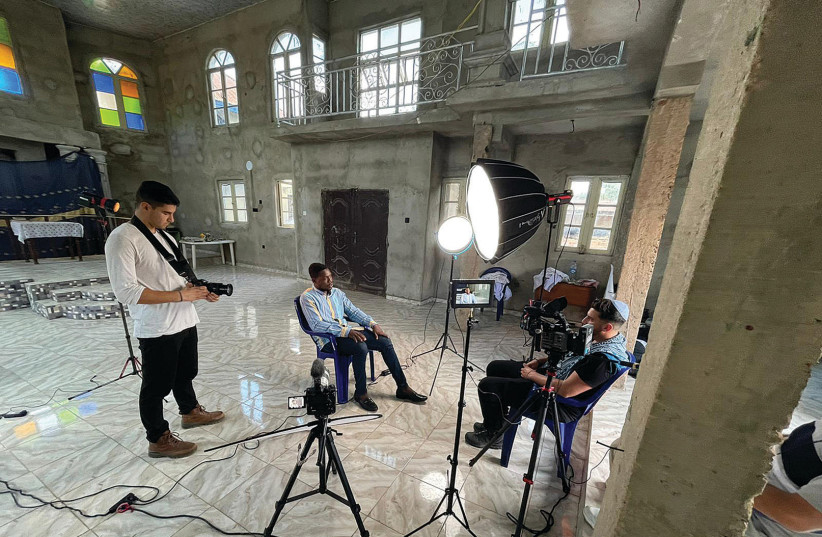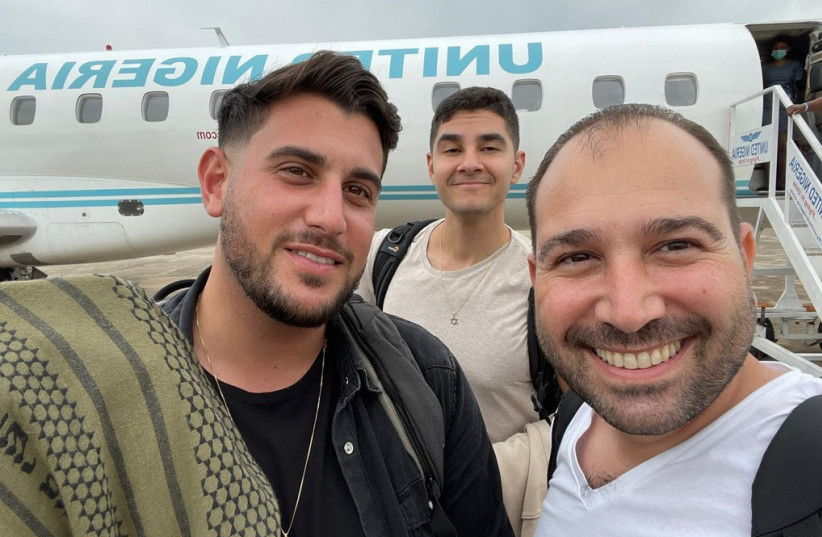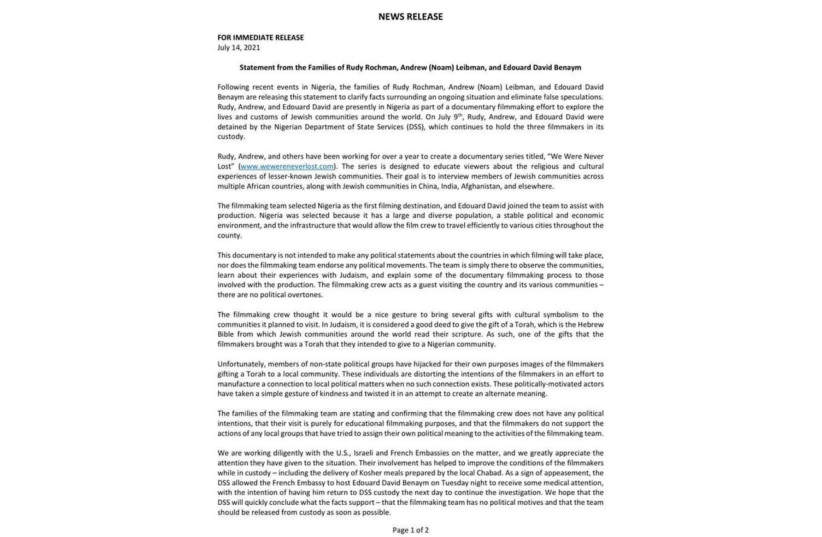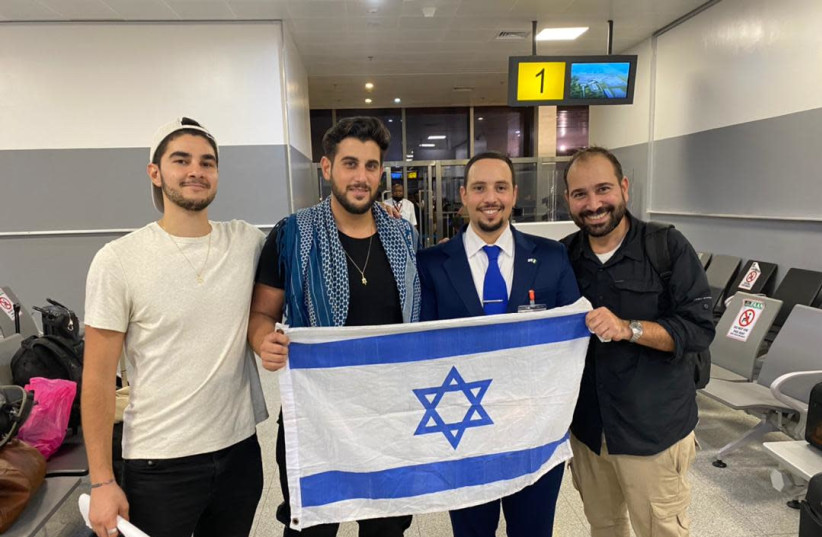Getting surrounded by 15 masked, black-clad gunmen hadn’t been part of Rudy Rochman’s plan for visiting Nigeria.
“I’ve never had an Israeli gun pointed at me,” Rochman, a Jewish rights activist and IDF veteran, mused to The Jerusalem Post about the Tavor assault rifles Nigerian forces aimed at him. “Usually it’s pointed in the other direction, not towards me.”
The original plan had been for filmmakers Andrew Leibman, Edouard David Benaym and Rochman to film Nigerian Jewish communities for their documentary series. When they were taken by gunmen, instead of a story about Nigerian Jews it became a harrowing tale of misinformation, families desperately working to free their loved ones, and a film crew navigating captivity and sectarian strife.
The story of Rochman, Leibman and Benaym in Nigeria didn’t begin at gunpoint, it started with a lie – a lie about their purpose in Nigeria.

The documentary
“One of the projects that our team is doing is something called ‘We Were Never Lost.’ It’s a documentary series... [about] disconnected communities of Jews around the world,” Rochman told the Post. “Our first season is to take place in Africa... the first country we set out to go to is Nigeria – because it’s just the biggest story.” Nigeria is home to the Igbo Jewish community.
The Igbo are an ethnic group native to Nigeria, numbering around 33 million. In 1967, the Igbo attempted to establish their own state, Biafra, which was dissolved in a bloody 1970 civil war. However, the Igbo secessionist movement still exists. It’s a sensitive political fault line that’s still active – and on it rests the Igbo Jewish community.
According to Rochman, many Igbo identify with having ancient Israelite roots, and “a small population of the Igbo still practice Judaism and have preserved that, or some of them have come back.”
“We arrived there July 6, and the goal was to... tell the story of this community,” said Rochman. The team came with a Torah, a gift to a Nigerian Jewish community.
On July 7, the lies began. Photos of them gifting the Torah began to circulate alongside conspiracy theories.
“You had these conspiracy theorists and bloggers that started to write, ‘these are Mossad agents that were sent to fight against the Nigerian government and to free Biafra,” Rochman said.
“When we saw these posts going viral, we made a public statement... that said, We’re not a part of any governmental or diplomatic mission.... We’re here purely to do a cultural project on the practicing Jewish community,” said Rochman. “We thought that this would be enough. Unfortunately, it wasn’t.”
The abduction
On July 9, 7:30 a.m. Friday morning, the police called them down to the lobby. Surrounded by 15 gunmen, the team was assured “‘Don’t worry, it’s just going to be an interview.... We just need to ask a few questions and clear some things up.’”
The police took their phones and passports. The team was divided and put into separate vehicles.
“They took us to a holding facility,” said Rochman, “There, we waited about an hour, then met with the director of the facility.”
The director questioned the crew, who explained their project. At first, the director didn’t seem to seriously suspect them of espionage.
Shabbat neared. Rochman ventured to tell him that they needed to return to prepare for the Jewish day of rest.
“There was a youth Shabbat organized with hundreds of Nigerian Jews,” Rochman told the Post.
“‘OK, you know what? You guys will leave in 15 minutes and you’ll come back on Sunday,’” the director told them
Rochman returned to the cell to share the good news. But 15 minutes passed. Then an hour, then hours. Then interrogations began anew. They were divided again, screamed at and accused of all manner of crimes. The team realized they weren’t going free that night. They brought in Shabbat in their cell, saying blessings over a few grapes and crackers.

The home front
Meanwhile, the filmmakers’ families realized something was awry. Benaym’s sibling couldn’t contact him. A family member noticed on an app that their location was a police station.
“We didn’t have any information about why they were taken,” said a family member. But they had seen the false allegations circulating on Nigerian news.
“We were in an emergency mode, trying to find out as much information as possible, trying to contact the embassies,” said the family member.
The families also reached out to local contacts in the area.
They had to decide between going to the media and making political noise – and being discreet, said the family member. “When things happen like this in Africa, it’s better to go low-key than to go the political route.”
A darker cell
On July 10, 7 a.m., the gunmen returned, bursting into the station with redoubled aggression. This time they put the team in the same vehicle. Rochman initially hoped this meant they were being returned to the hotel.
“Where are we going?” Rochman asked a gunman.
“‘You don’t need to know.’”
Rochman began to worry. It didn’t sit well with him – the aggression, being moved to a new location.
“It almost felt like they were going to take us somewhere and just execute us,” said Rochman.
“I’m starting to think, OK, how am I going to take this person’s gun and then kill the people in the car so that we can escape with our lives? How do we make it out of here? What’s the best chance of survival to get out of the situation?”
Rochman resolved to take action if they didn’t tell him the destination within an hour.
Fortunately, they relented. They were taking the crew to the Department of State Services headquarters in Abuja, Nigeria’s capital. The DSS, Rochman explained, was analogous to the FBI or Shin Bet. Reassuringly, they were promised not only that their phones and passports would be returned, but the Israeli ambassador would meet them at the headquarters.
There was no ambassador. Only another cell, darker and danker than the previous one. They had again been duped with false promises. The crew were ordered to remove their shoes, wallets and accessories.
“‘Where’s our ambassador? We were promised our ambassador, promised our phones, what’s going on?’” Rochman asked his captors.
“‘I don’t know who you spoke to, but you’re not going to get your ambassadors,’” The crew were told, and though the crew passively resisted, the guards pushed them into the cell.
“There’s no light. You can’t see anything. You can maybe do three or four steps in each direction. It’s extremely small,” Rochman described the cell. “There’s no chairs, no couches, no beds. Just the floor with nothing. There’s rat feces everywhere. There’s human piss on the floor and in bottles next to us, from former inmates. There’s cockroaches – dead and alive – all over.”
The walls were dark with the grime of unwashed human bodies. Higher up, there were tallies marking days, and writings: “May my life see happiness one more time,” and “They’re going to take me tomorrow. So please remember my name.” They were “writing as if it’s their last day before they get executed,” said Rochman.
Once in the cell, Rochman says, his first thought was “how do we reach out to the world and make people know where we are? Because at this point they know that we’re missing, but they don’t know exactly where we are. So how do we do that?”
There was no food for three days. On the fourth, the crew decided to accept only kosher food. The reasoning was the only place with kosher food in Abuja was the Chabad house. Chabad would know that they were missing, and understand who the food was for.
However, by July 13, the filmmakers’ families had already located them, and managed to reach the ambassador. On the fifth day of captivity, the crew finally met a diplomat.
“For us, that was a big relief that finally we know that we’re going to be taken care of.... And he got them to agree to bring us one meal a day from Chabad.”
On the sixth day they received food. The matriarch of an Igbo Jewish community was imprisoned with them. Each time a meal was brought, they would set some aside for her.
During this period, Benaym grew sick. He had an autoimmune disease, and his medication was at the hotel. Eventually, the DSS allowed him to be taken to the French Embassy, to return periodically for interrogations.
Misinformation
Meanwhile, the filmmakers’ families had another challenge – news of the arrests had broken in mainstream media.
“People started spreading a lot of false information,” said a family member. “For my family, basically for the three weeks... a lot of the time was basically trying to look at what news was coming out to make sure that there wasn’t any fake information.”
Some articles claimed the filmmakers had met with Igbo separatists.
“Journalists need to understand that the people in the DSS that had abducted us were reading those articles,” said Rudy.
On July 14, the family released a press statement setting the record straight, emphasizing that the men were in Nigeria for an apolitical documentary project.
The family was deeply concerned that poking sensitive political wounds would lead to greater injury.
A protest, which would have included Biafran flags, was planned in front of the New York Nigerian Consulate. The families had it canceled.

Treated like animals
On July 15, the team was allowed to bathe. This was done with buckets of water – the same buckets inmates used to wash after relieving themselves.
“They were treating us like animals.... We had no rights, no lawyer, no phone call, no going outside,” said Rochman.
On the seventh day, the crew was moved to a new cell. They had two new roommates: A Boko Haram terrorist who killed 70 people and a gun smuggler.
“The whole time there we were in survival mode,” said Rochman. “The guards might want to do something. The people they put us in with might.”
One guard, a massive bully, threatened Rochman with violence when the filmmaker tried to seek a senior official to plead his case. Rochman stood up to the guard. Fortunately, all he earned was the bully’s respect.
Freedom
On the home front, the men also earned the support of thousands of followers.
“Everybody was reaching out to us,” said a family member. “We had so much support during this time.”
With this support, Rochman’s “parents went all the way up to the Biden administration, to the Macron administration.... They applied heavy political pressure to get us out,” Rudy said.
After three weeks, the crew was finally released. The men were taken almost directly to the airport. Only when boarding their flights were their passports and phones returned. They flew to Israel via Istanbul, and arrived about a week ago.
“It was very clear that they never actually suspected us,” said Rudy. “What they truly wanted to do is to prevent this film that we were doing from happening.”
“This isn’t only a story about our experience. The story is about the Igbo Jewish community and the suffering that they go through. And our experience is just a small example” of that broader story.
Rochman and company plan to continue the film project, and tell the story of other disenfranchised Jewish communities around the world.
Hopefully, those adventures will go according to plan.
The documentary We Were Never Lost is raising funds here to produce the series.

